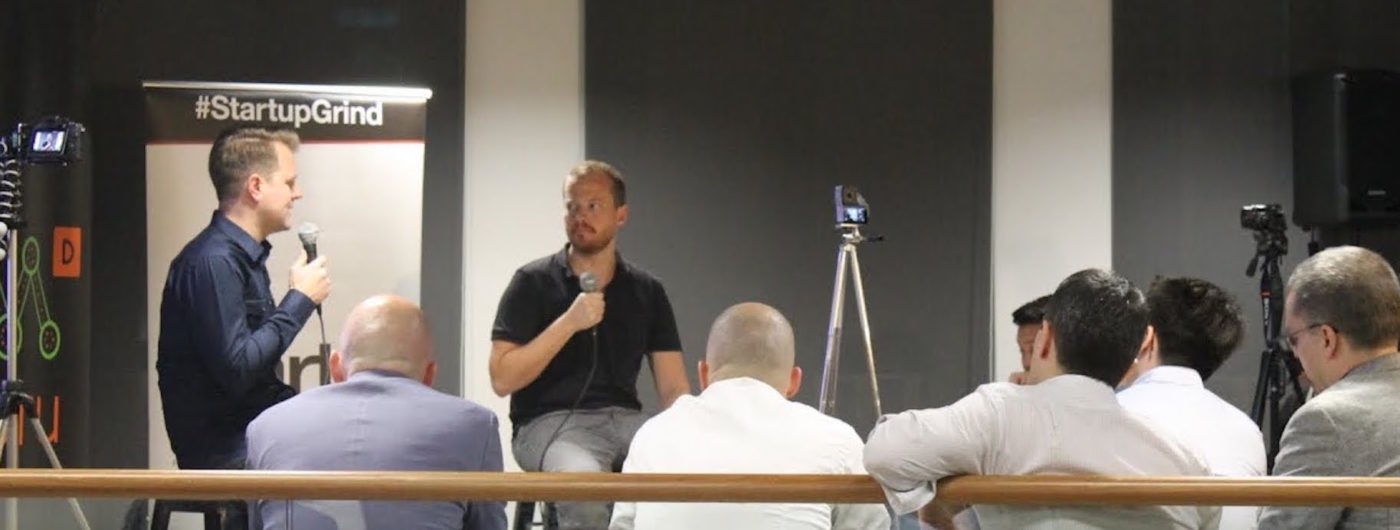
Matthew Tillman is a mentor and speaker within our global ecosystem of founders. To receive peer mentorship from Matthew and over 600 fellow Tech Founders, please request an invite and join our global network.
Matthew Tillman wanted to be part of something tangible, something that would solve a real problem for real people. So after his previous startup SET Media was acquired by Conversant, Matthew decided to break into one of the most closed-off, inaccessible industries existing today— shipping. Now, after recruiting a former Supply Manager at Apple and Nest as his Co-Founder and raising $18M from Spark Capital and others, Matthew maintains that a focus on helping the customer is his key to the success of Haven.
I Wanted to be Part of Something Real and Tangible
After learning how the media space worked and having 2 successful businesses in that industry, I became disenfranchised with it. I wanted to be a part of something that was real and tangible. I didn’t care about ships or trucks as concepts. But I did like the fact that there was this massive network of atoms that spans the entire planet, and that we’re all completely dependent on it.
I started Haven because I had the ambition of sending a truck to South America, and racing it along the Pan- American highway back to Alaska. In this process I was going around trying to find ways to put my friend’s truck on a ship. I ended up creating a reverse auction via email to different freight forwarders.
That’s when I discovered there are more than 190,000 freight forwarders around the world. In the process of trying to book freight and send a truck to Argentina, I learned about freight pricing and how the process of going about reserving space works. The inefficiencies shocked me. I started sending out email blasts to account managers of freight forwarders, asking them how they priced. I found the process really fascinating. That’s what kicked the idea off.
Identifying Selection Bias
My co-founder had run procurement in factories for Apple before building the Nest manufacturing process. He confirmed that logistics is a complete mess. The way he explained it was: You’ve got all these containers all over the world, and if you’re Apple, you’ve got $4.5M worth of goods in a container. At the time he had a million people that worked in one of these factories, and so he said there was a million people who want to go to work, but they can’t because some freight forwarder didn’t pay their carriers on time.
So we walked through that problem, met with Apple execs, and realized that everyone has this problem: you have carriers, then you have 190k+ freight forwarders, then they go out to shippers (SMB’s) and they say “we know how to get your product from point A to point B”. But what actually happens is they create selection bias, and that’s rampant in the logistics industry. It’s because everyone in the logistics industry is trading against each other. Shippers are looking for how they can ship millions of tons of cargo and everyone (forwarders, shipping lines, etc) uses that against them.
So we recognized that there were startups trying to be better freight forwarders, and that we were looking to do something with technology that couldn’t possibly happen without further development. So instead of being a better broker, we decided to build a platform specifically for the shippers need for visibility and data.
A Shockingly Unique Position
Focusing on helping the customer is a shockingly unique position. It’s really easy to charge a little bit of a mark-up here and there, it’s a lot more difficult to say that you’re going to change the way the economics of this industry work. And it’s a straightforward concept, but it requires a lot of product and a lot of capital.
So when starting Haven, the question was always: Can we provide real value to the customer? And the answer to this day must be yes, or we’re not doing it. But as your business grows, it becomes more difficult to maintain your focus on the customer, especially as more stakeholders become involved. However, through my experience, there are several things founders can do to make sure they continue to focus on the customer:
1. Don’t Lose Focus On the Customer After Raising Funds
I’ve had a 2 decade record of success. So when I raised, I was able to tell investors “this is the thing we’re doing, do you believe in it or not”. We had a very frank conversation, which was, “I think we can bring value to the shippers, and let’s focus on that.” The way that we have that conversation with investors beyond the subjective is to look at the metrics we would be able to achieve if we were successful at this. Which is that no brokers in this space capture 100% of the customer’s freight spend.
From a software perspective, we can use the data we get, contract that, and then as investors in the business, we will be able to use 100% of the customers volume, and provide higher value and a better ROI and have this reinforcing flywheel that focuses on the customer. But that’s really something you have to tell your investors, and be clear about it.
2. Your Culture Dictates Your Product
Haven has such a different company culture than my former companies. In a trading firm, there’s a culture of arbitrage, and of deals. At Haven there’s a culture of product. For example you look at IBM and you wonder why they don’t have a procurement network. And it’s because they don’t have a culture of trading, they have a culture of product.
The culture that we built at Haven is product. I wrote Machine Learning software for 14 years. So we have this tech focus at the company that started at its inception. And that has helped us build great product. It has hurt us in terms of extracting every amount of revenue from every customer. You really have to commit to product as a product company.
3. Hiring From Your Industry Doesn’t Always Pay Off
I completely failed in certain hiring instances where I hired people from the shipping industry. We hired people who were very smart and very good. But as soon as they came to our company, they didn’t know how to sell product, they only knew how to sell freight. So we had to completely reorganize that team, and we don’t hire from the logistics space now.
When it comes to bringing someone onto our team, there are other things I like to hire for; curiosity, excitement over the vision, intelligence. Never ever hire for a rolodex.
To Summarize:
- Focus on who you bring into your team, and that means the investors.
- When you’re picking an industry, make sure your take on that industry is something that you’re committed to, which is your brand.
- Focus on who you surround yourself with. Make sure you like your customers and your team. You have to have empathy for your customers to have a great product.






